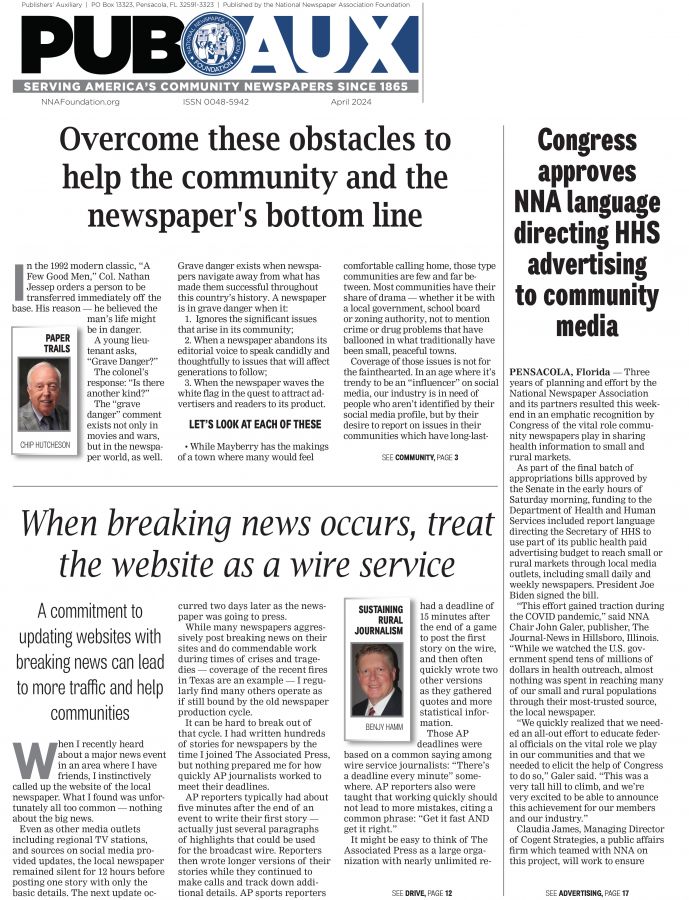Bill to pull NJ public notices from newspapers delayed
Jan 5, 2017
By Tonda F. Rush
NNA | Director of Public Policy
TRENTON, NJ—The industry’s most imminent threat of the loss of all newspaper public notices in a single state was averted by the New Jersey Press Association in late December as its legislature wound down an intense week.
A pair of bills dubbed by the Star-Ledger of Newark as a newspaper “revenge bill” was catapulted to a lead position in mid-December by New Jersey Gov. Chris Christie. Newspapers reported that Christie was looking for payback for coverage of the Bridgegate scandal that led to the conviction of some administration officials for closing access lanes to the nation’s busiest bridge as retribution against a Democratic mayor who refused to endorse the Republican governor.
The bills would have given government entities of all stripes, including the state’s 565 separate municipalities, the option to use their individual websites to fulfill their public notification requirements—in lieu of newspapers. Although the bills were promoted as recognition of a digital revolution away from print, NJPA quickly pointed out that notices carried in New Jersey newspapers have been posted at www.njpublicnotices.com at no cost to taxpayers since 2003. If the bills had passed, New Jersey would have been the only state in the nation to face sweeping conversion of public notices out of newspapers.
Larger newspapers attacked the bills as a way to weaken newspapers, saying they would rip 300 jobs out of the newsrooms. Smaller newspapers, led by the New Jersey Hills Media Group of former NNA President Liz Parker and her brother Stephen Parker, argued that the combined readership of print and newspaper digital is demonstrably far greater than of the municipal websites that would have inherited the notices. They noted that public notices are about maintaining transparency and accountability of elected officials and government entities—all for the taxpayers’ benefit.
Christie asserted that the notices cost New Jersey taxpayers $80 million but declined to provide sources for his number. Newspapers said that the number was closer to $20 million, and reminded legislators that approximately 70 percent are either paid for directly by private parties like law firms or reimbursed in full to the governments.
The purported “savings to towns” was questioned even by the state’s nonpartisan Office of Legislative Services, which said the cost of administering the bill might be greater than expected.
During an intense six days of wrangling, the 15 in-state dailies all carried searing editorials blasting the governor and legislative leaders for the rush job. Gannett’s six NJ dailies carried front page editorials. Weeklies posted editorials and op-eds online.
For community newspapers, a highlight was the appearance of Senate Majority Leader Loretta Weinberg, the 81-year-old known as the liberal conscience of the legislature, who led the fight against the bill, proudly sporting a National Newspaper Association “We Believe in Newspapers” button.
The surprise bill was posted December 12, heard by both committees December 14, and moved for floor votes in both houses for December 19.
After hours of closed-door debate in party caucuses on the 19th, the Assembly leadership said the bill would be tabled, with NJPA’s commitment to meet with legislators in January to undertake a constructive review of the state’s decades-old notification laws. Christie’s office announced it was willing to delay action but that the measure would be back.
The Star-Ledger and others reported that the bill was rolled out as part of a deal to grant raises to cabinet officers, judges and legislative staffs, and to relax ethics rules so that the governor, a former presidential hopeful, could retain profits from a forthcoming book.
The fast-track of the proposals attracted the attention of the entire industry, which has become attuned to the potential of public notice bills being used as journalism payback.
“We are always vulnerable to these attacks,” said NNA President Matthew Paxton IV, publisher of The News-Gazette, Lexington, VA. “We have seen them in Virginia and across other states. The good news about these is that the general public, even when they profess cynicism about the news, do not like to see politicians attacking newspapers. The bad news is that these bills are usually crafted in back room deals and are intended to slide through at a moment’s notice.
“There is no way we can prevent the attacks. But the key to averting them is to work with legislators off-session when the heat is off. We tend to find that most think they are fighting a good fight to digitize notices and do not realize newspapers have already done it. They usually are being fed inflated numbers about the public cost of the notices, as well as the new costs of replacing newspapers with government systems. And rarely have they thought through the need for archives and authentication. These bills loom up and look bigger than life, but they aren’t. Newspapers are still the best avenues. We just have to do our homework with our lawmakers so they are better equipped to defend the public against these attacks.”
George White, NJPA executive director, camped out at the Legislature during most of the week-long siege. He agreed that the time for calmer conversations was outside the heated atmosphere of artificial urgency and deadlines imposed in the middle of the state’s two-year session.
“With the bills ultimately held, NJPA looks forward to meeting with legislators early in 2017 to continue discussions without the angst of this past week’s indefensible rush job,” he said.







